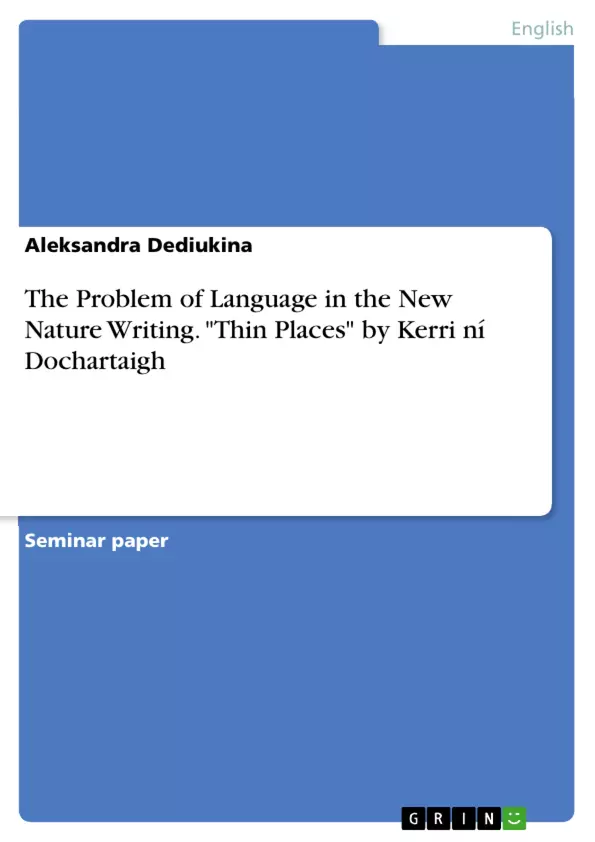This term paper is devoted to the problem of language, raised in the memoir "Thin places" (quoted as T. P.) by the Northern Irish writer Kerri ní Dochartaigh. By its formal and content-related features, this autobiographical book can be categorised as new nature writing. The main aim of this work is to examine the ways the genre-specific features manifest themselves through the problem of language — its critical status, interlinkedness with ethnic roots and native land, and the possible measures to preserve and revive it.
The statement, hence, is the following: the problem of language, raised in "Thin Places" by Kerri ní Dochartaigh, helps to reveal the genre specificities of new nature writing in the book.
The paper is divided into two chapters: "Behind the Book" and "Thin Places as New Nature Writing". In the former, there are two sections. Successively, the genre specificities of life writing and new nature writing will be considered, and their combination within the realms of one book will be addressed. In addition, some background information about Kerri ní Dochartaigh and her professional path as a nature author will be represented.
Inhaltsverzeichnis (Table of Contents)
- Introduction
- Behind the Book
- Life- and Nature Writing: Fruitful Symbiosis
- Life Writing and its Specificities
- New Nature Writing. What is New?
- Kerri ní Dochartaigh - Mother and Writer
- Life- and Nature Writing: Fruitful Symbiosis
- Thin Places as New Nature Writing
- Language and Land: the Interrupted Dialogue
- 'That is not just a Human World'
- Motherland and Motherhood
- Conclusion
Zielsetzung und Themenschwerpunkte (Objectives and Key Themes)
This term paper examines the role of language in Kerri ní Dochartaigh's memoir Thin Places, analyzing how it reveals the genre-specific features of new nature writing. The paper explores the complex relationship between language, identity, and the natural world in the context of Northern Ireland's political and cultural landscape.
- The intersection of life writing and new nature writing in Thin Places
- The significance of the Irish language in shaping identity and connection to the land
- The role of language in fostering environmental and gender awareness
- The relationship between motherhood, the natural world, and Irish mythology
- The impact of political and historical events on personal identity and the experience of place
Zusammenfassung der Kapitel (Chapter Summaries)
The first chapter delves into the theoretical foundations of life writing and new nature writing, providing a framework for understanding the genre-specific features of Thin Places. It also introduces Kerri ní Dochartaigh as an author and explores her background.
The second chapter examines the memoir itself, focusing on how language plays a crucial role in revealing the complex relationship between the author, her Irish identity, and the natural world. It explores the significance of the Irish language, its connection to the land, and its contribution to environmental and gender awareness.
Schlüsselwörter (Keywords)
This paper explores the key themes of language, identity, nature writing, Irish culture, Northern Ireland, life writing, post-colonialism, and motherhood. It draws attention to the specificities of new nature writing, emphasizing the interconnectedness between the individual and the natural world through language and cultural heritage.
- Quote paper
- Aleksandra Dediukina (Author), 2024, The Problem of Language in the New Nature Writing. "Thin Places" by Kerri ní Dochartaigh, Munich, GRIN Verlag, https://www.hausarbeiten.de/document/1477201


